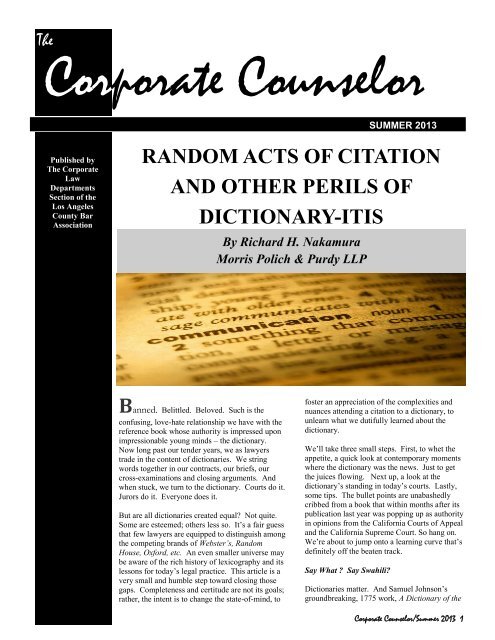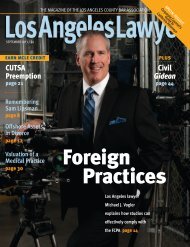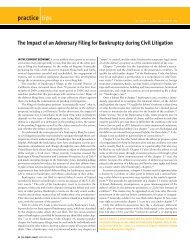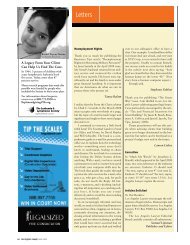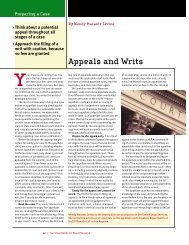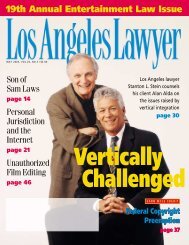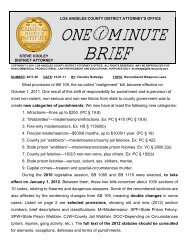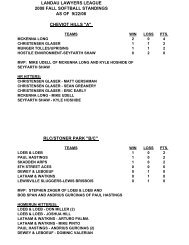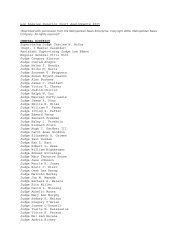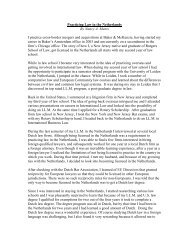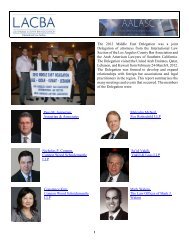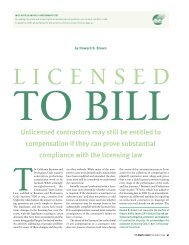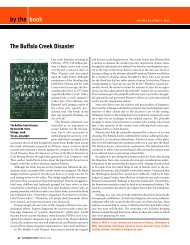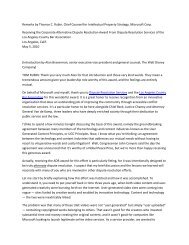here - Los Angeles County Bar Association
here - Los Angeles County Bar Association
here - Los Angeles County Bar Association
You also want an ePaper? Increase the reach of your titles
YUMPU automatically turns print PDFs into web optimized ePapers that Google loves.
The<br />
Corporate Counselor<br />
SUMMER 2013<br />
f<br />
Published by<br />
The Corporate<br />
Law<br />
Departments<br />
Section of the<br />
<strong>Los</strong> <strong>Angeles</strong><br />
<strong>County</strong> <strong>Bar</strong><br />
<strong>Association</strong><br />
RANDOM ACTS OF CITATION<br />
AND OTHER PERILS OF<br />
DICTIONARY-ITIS<br />
By Richard H. Nakamura<br />
Morris Polich & Purdy LLP<br />
Banned. Belittled. Beloved. Such is the<br />
confusing, love-hate relationship we have with the<br />
reference book whose authority is impressed upon<br />
impressionable young minds – the dictionary.<br />
Now long past our tender years, we as lawyers<br />
trade in the content of dictionaries. We string<br />
words together in our contracts, our briefs, our<br />
cross-examinations and closing arguments. And<br />
when stuck, we turn to the dictionary. Courts do it.<br />
Jurors do it. Everyone does it.<br />
But are all dictionaries created equal? Not quite.<br />
Some are esteemed; others less so. It’s a fair guess<br />
that few lawyers are equipped to distinguish among<br />
the competing brands of Webster’s, Random<br />
House, Oxford, etc. An even smaller universe may<br />
be aware of the rich history of lexicography and its<br />
lessons for today’s legal practice. This article is a<br />
very small and humble step toward closing those<br />
gaps. Completeness and certitude are not its goals;<br />
rather, the intent is to change the state-of-mind, to<br />
foster an appreciation of the complexities and<br />
nuances attending a citation to a dictionary, to<br />
unlearn what we dutifully learned about the<br />
dictionary.<br />
We’ll take three small steps. First, to whet the<br />
appetite, a quick look at contemporary moments<br />
w<strong>here</strong> the dictionary was the news. Just to get<br />
the juices flowing. Next up, a look at the<br />
dictionary’s standing in today’s courts. Lastly,<br />
some tips. The bullet points are unabashedly<br />
cribbed from a book that within months after its<br />
publication last year was popping up as authority<br />
in opinions from the California Courts of Appeal<br />
and the California Supreme Court. So hang on.<br />
We’re about to jump onto a learning curve that’s<br />
definitely off the beaten track.<br />
Say What ? Say Swahili?<br />
Dictionaries matter. And Samuel Johnson’s<br />
groundbreaking, 1775 work, A Dictionary of the<br />
Corporate Counselor/Summer 2013 1
English Language is widely credited with making that<br />
happen. 1 To Johnson, however, a lexicographer was “a<br />
harmless drudge.” 2 Today, the work of the dictionary writer<br />
may still be drudgery, but not harmless.<br />
In 2010, a school district in Riverside <strong>County</strong>, California,<br />
yanked Merriam-Webster’s 10th Collegiate Dictionary<br />
edition off classroom shelves after a parent complained that<br />
a child discovered the dictionary’s sexually graphic –<br />
actually, rather clinical –<br />
Morris Polich & Purdy LLP<br />
<strong>Los</strong> <strong>Angeles</strong> Office<br />
1055 West Seventh Street, 24th Floor<br />
<strong>Los</strong> <strong>Angeles</strong>, CA 90017<br />
Telephone: 213.891.9100<br />
Fax: 213.488.1178<br />
Website: www.mpplaw.com<br />
The lawyers at Morris Polich &<br />
Purdy LLP work with clients on a<br />
national basis, representing clients’<br />
interests in every state and many U.S.<br />
possessions. MPP has offices in <strong>Los</strong><br />
<strong>Angeles</strong>, Irvine, San Diego, San<br />
Francisco and Las Vegas, and a<br />
wealth of international affiliations.<br />
The Firm has a distinguished<br />
representation in appellate advocacy,<br />
and has served as appellate counsel<br />
in over 100 published appellate<br />
opinions. Eight are landmark<br />
decisions from the California<br />
Supreme Court.<br />
up is not readily ascertainable.<br />
definitions of oral sex. The<br />
dictionary reportedly was in<br />
the reference section of<br />
fourth and fifth grade<br />
classrooms, then removed<br />
until a committee could<br />
determine if it was “age<br />
appropriate.” The dictionary<br />
eventually returned to the<br />
classroom, but students were<br />
given permission slips so<br />
that parents who did not<br />
want their children<br />
consulting Webster’s could<br />
opt for an alternative. 3 The<br />
title of the alternative<br />
dictionary was not reported.<br />
Webster’s 9th Collegiate –<br />
the edition published before<br />
the Riverside <strong>County</strong><br />
kerfuffle – had appeared on<br />
the New York Times weekly<br />
best seller list 195 times. 4<br />
Whether that record<br />
continued with Webster’s<br />
10th after the oral sex blow<br />
T<strong>here</strong> is rich historical irony <strong>here</strong>. The dictionary’s<br />
namesake deliberately excluded vulgar terms from his book .<br />
Webster, according to one respected lexicographer, “omitted<br />
fart and turd, for instance, and any term having sexual or<br />
excretory meaning. He maintained an abhorrence of<br />
indelicate words throughout his life and never entered them<br />
in his dictionaries.” 5 The objecting parents in Riverside<br />
<strong>County</strong> must have been channeling Noah Webster.<br />
Parents are not the only group to have taken aim lately at a<br />
dictionary. So have prison officials.<br />
In 2001, the warden at Pelican Bay State Prison issued a<br />
memorandum barring inmates from using publications<br />
written in Swahili, Nahuatl, Runic or Celtic because those<br />
languages were reportedly being used by inmates to pass<br />
coded messages. The ban included dictionaries written in<br />
those languages. Pursuant to this policy, an inmate was<br />
denied access to Teach Yourself Swahili. His civil rights<br />
claim was dismissed because prison officials were entitled<br />
to qualified immunity. 6<br />
As lawyers, however, our forum is neither the school<br />
yard nor the prison yard. What does the law make of<br />
the dictionary?<br />
Do As We Say, Not As We Do.<br />
We have a federal Dictionary Act. Set forth at 1 U.S.C.<br />
§§ 1, et seq., the Dictionary Act contains a limited set<br />
of default definitions for words both neutral and<br />
controversial, i.e., vessel and vehicle; and marriage. 7<br />
Congress amended the Dictionary Act last year. As of<br />
this year, an insane person no longer includes a lunatic<br />
– federally speaking. 8 Marriage is a work in progress.<br />
But what of the dictionary in general?<br />
Noah Webster wanted his squeaky-clean dictionary<br />
endorsed by the Supreme Court. Chief Justice John<br />
Marshall rejected the offer. 9 The latent hostility lives<br />
on.<br />
“Lexicographers,” declared one California Court of<br />
Appeal, “are not generally the authors of our laws. If<br />
they were, perhaps blind reference to dictionary<br />
definitions of a statute’s terms would adequately<br />
substitute for the process of judicial interpretation. As<br />
it is, however, dictionaries can only aid in the<br />
determination of the Legislature’s intent in the<br />
enactment of a law.” 10 The California Supreme Court<br />
was more direct: “To seek the meaning of a statute is<br />
not simply to look up dictionary definitions and then<br />
stitch together the results. Rather, it is to discern the<br />
sense of the statute, and t<strong>here</strong>fore its words, in the legal<br />
and broader culture.” 11<br />
Actions, however, may speak louder than words.<br />
Despite repeated warnings from courts “not to make a<br />
fortress out of a dictionary,” 12 their use of the dictionary<br />
as an interpretive aid is on the rise. Scholars point out<br />
that through the 2000-2001 and 2009-2010 terms of the<br />
United States Supreme Court, the Justices referenced<br />
dictionary definitions to define nearly 300 words or<br />
phrases. 13 In contrast, in the quarter century between<br />
1958 and 1983, the Court cited dictionaries an average<br />
of five times per Term. 14<br />
Five times per Term? Today’s Court meets and beats<br />
that benchmark in a single opinion. In 2011, one<br />
opinion looked to three different dictionaries to define<br />
of, and two more dictionaries to define retain. Board<br />
of Trustees of Leland Stanford Junior Univ. v. Roche<br />
Molecular Systems, Inc. (2011) 563 U.S. __, 131 S.Ct.<br />
2188, 2196-2197. 15 Last year, the Court cited a dozen<br />
dictionaries to help it decide whether interpreter<br />
included someone who translates written documents.<br />
Taniguchi v. Kan Pacific Saipan, Ltd. (2012) 566 U.S.<br />
__, 132 S.Ct. 1997, 2002-2003. 16 If that’s not a<br />
fortress, what is?<br />
How did the Court choose which dictionaries to use?<br />
As Kirchmeier and Thumma point out, today’s court<br />
2 Corporate Counselor / Summer 2013
“continues to use dictionaries at a high rate with little<br />
guidance for parties, lawyers or others regarding when to<br />
turn to dictionaries, which dictionaries to use, and how to<br />
use dictionaries.” 17<br />
So What’s A Lawyer To Do?<br />
What are the rules? Is t<strong>here</strong> a list of “citable” and “noncitable”<br />
dictionaries? A lexicographic “A” list and “B”<br />
list? Perhaps – but it’s tucked away, easy to miss.<br />
Law review treatments on lexicography and the law tend to<br />
run long. Scaling the Lexicon Fortress, for example,<br />
weighs in at over 220 pages. Among non-legal<br />
publications, even a general lexicographic treatment can be<br />
taxing – Landau’s discussion, in paperback, runs 310<br />
pages, excluding the extensive notes. Discerning the “in”<br />
and “out” dictionaries from these texts can indeed be<br />
drudgery.<br />
But in February of 2013, the California Supreme Court<br />
cited, for the first time, Reading Law: The Interpretation of<br />
Legal Texts by United States Supreme Court Associate<br />
Justice Antonin Scalia, and noted author and lecturer on<br />
legal usage, Bryan A. Garner. 18 Otherwise innocuous, the<br />
California Supreme Court’s citation to Reading Law was<br />
notable for several reasons.<br />
First, Reading Law had been published only seven months<br />
earlier. Within three months of its publication, however,<br />
California Courts of Appeal were already conferring<br />
citation status upon Reading Law. 19<br />
Second, the authors of Reading Law are still alive. Very<br />
much alive – with one author a sitting associate justice on<br />
the nation’s highest court, and the other a prolific lecturer<br />
and speaker on legal usage. These are full-throttle,<br />
American lawyers. As contemporary authority, it does not<br />
get much more contemporary than this.<br />
And last, but by no means least, Reading Law contains an<br />
Appendix titled, “A Note On The Use Of Dictionaries.” 20<br />
The Note delineates five “primary principles” about using<br />
a dictionary in legal analysis. The principles merit a full<br />
quotation:<br />
“The primary principles to remember in using dictionaries<br />
are these:<br />
“• A dictionary definition states the core meaning of a<br />
term. It cannot delineate the periphery.<br />
“• Because common words typically have more than one<br />
meaning, you must use the context in which a given word<br />
appears to determine its aptest, most likely sense.<br />
“• You must consult the prefatory material to understand<br />
the principles on which the dictionary has been assembled.<br />
The ordering of senses provides a classic example.<br />
Although many people assume that the first sense listed in a<br />
dictionary is the ‘main’ sense, that is often quite untrue.<br />
[footnote omitted] Some dictionaries list senses from oldest<br />
in the language (putting obsolete or archaic senses first) to<br />
newest. Others list them according to current frequency.<br />
Using a dictionary knowledgeably requires a close reading<br />
of the principles discussed at<br />
the outset.<br />
“• Dictionaries tend to lag<br />
behind linguistic realities –<br />
so a term now known to have<br />
first occurred in print in<br />
1900 might not have made<br />
its way into a dictionary until<br />
1950 or even 2000. If you<br />
are seeking to ascertain the<br />
meaning of a term in an 1819<br />
statute, it is generally quite<br />
permissible to consult an<br />
1828 dictionary.<br />
“• Historical dictionaries,<br />
such as the Oxford English<br />
Dictionary (20 vol.; 2d ed.<br />
1989; updated online) or the<br />
out-of-print Century<br />
Dictionary (12 vols.; last<br />
revised 1914) are the most<br />
reliable sources for historical<br />
terms. But they are often<br />
least useful for very recent<br />
shifts in meaning.” 21<br />
At last. A PowerPoint-like<br />
slide to guide one’s use of a<br />
dictionary. So crisp. So<br />
American. And so hard to<br />
obey.<br />
Richard Nakamura works<br />
with general counsel and<br />
trial attorneys throughout the<br />
country on appellate matters.<br />
As the leader of MPP’s<br />
Appellate Practice Group, he<br />
specializes in the<br />
unaccredited specialties of<br />
simplicity, persuasiveness<br />
on the merits, and always<br />
keeping the court in mind.<br />
He can be reached directly at<br />
(213) 417-5335 or at<br />
Rnakamura@mpplaw.com.<br />
When’s the last time you<br />
consulted the prefatory material of a dictionary to determine<br />
how multiple definitions were ordered? It does make a<br />
difference. For example, The American Heritage<br />
Dictionary, 2d College Edition (1982) presents “the most<br />
prevalent, contemporary sense or meaning of a word first,<br />
with the other shades of meaning following logically from<br />
this current, central concept.” 22 In contrast, Webster’s New<br />
World College Dictionary, 3d Edition, takes the opposite<br />
approach, arranging the senses in historical order, beginning<br />
with word’s earliest sense. “Thus, the most common<br />
present-day meaning of a word may appear near the end of<br />
an entry.” 23<br />
Reading Law also gives us what Scalia and Garner believe<br />
are “the most useful and authoritative [dictionaries] for the<br />
English language generally and for law.” 24 Their list is<br />
broken into 50-year time spans, and begins with the period<br />
1750-1800 and ends with the period 2001 to the present.<br />
(Continued on page 6)<br />
Corporate Counselor/Summer 2013 3
By: Roberta Kass<br />
Associate General Counsel, Vice President<br />
and Corporate Secretary<br />
BreitBurn Energy Partners<br />
Dear Fellow Corporate Counselors:<br />
I hope you have all enjoyed this summer. The<br />
Corporate Law Departments Section doesn’t meet<br />
in August, and we use it to relax and give some<br />
thought to the year ahead and the many goals we’ve<br />
set for the Section for the coming year. We’re<br />
looking forward to providing the <strong>Los</strong> <strong>Angeles</strong><br />
community of in-house practitioners with a variety<br />
of educational, social and networking events in<br />
2013 and 2014. Looking ahead, <strong>here</strong> are the<br />
highlights of our planned activities in 2013 and<br />
2014.<br />
Institute for Corporate Counsel: December 3rd<br />
one day seminar to be held at the California Club in<br />
downtown <strong>Los</strong> <strong>Angeles</strong>. This collaboration<br />
between the Section and the University of Southern<br />
California Gould School of Law is now in its 32 nd<br />
year. It is a premier event for in-house and outside<br />
counsel to learn about legal developments, discuss<br />
issues from their respective practices, and meet new<br />
and known colleagues in the legal and business<br />
communities in <strong>Los</strong> <strong>Angeles</strong>. The Institute<br />
continues with its theme of “Developments in Law,<br />
Politics and Business.” Some of the featured<br />
speakers will be former Governor Pete Wilson,<br />
California State Assembly Speaker John Perez and<br />
L.A. City Attorney Mike Feuer. They will be on a<br />
panel discussing the Past, Present and Future of<br />
California and <strong>Los</strong> <strong>Angeles</strong>. In addition, the<br />
panelists will include over 20 top counsel, including<br />
former members of the Solicitor General’s Office,<br />
the general counsel from Sourcefire, Toyota Motor<br />
Sales, U.S.A. and the University of Southern<br />
California, in house counsel from Flextronics<br />
International, Occidental Petroleum Corporation<br />
and U.S. Bank and L.A. Superior Court Judge<br />
William Highberger. For more information, please<br />
go to http://law.usc.edu/cle/icc/.<br />
4 Corporate Counselor / Summer 2013<br />
Corporate Roundtable 2014: The Corporate<br />
Roundtable provides an opportunity for a smaller<br />
group of general and senior in house counsel to<br />
discuss trending legal issues and topics. The four<br />
sessions in 2014 will be held Wednesday<br />
evenings: January 15, January 29, February 12<br />
and February 26 at the <strong>Los</strong> <strong>Angeles</strong> Athletic<br />
Club. Each<br />
evening will<br />
begin with a<br />
networking<br />
reception,<br />
followed by<br />
dinner and<br />
discussion.<br />
The 2014<br />
program is<br />
still being<br />
developed,<br />
and we<br />
welcome<br />
hearing your<br />
suggestions for relevant topics. The 2013<br />
Corporate Roundtable was ably chaired by June<br />
Baldwin, (SVP, General Counsel, Corporate and<br />
Legal Affairs at KCETLink) and provoked lively<br />
discussions on IP Strategy, Social Media and the<br />
Foreign Corrupt Practices Act. Thank you to<br />
each discussion leader and all those who<br />
participated in the 2013 Corporate Roundtable.<br />
Outstanding Corporate Counsel Award<br />
(“OCCA”) Dinner: Spring 2014, with location<br />
and honoree to be announced. This is the<br />
Section’s major dinner event. Each year we<br />
honor a leader of the in house <strong>Los</strong> <strong>Angeles</strong> legal<br />
community. Our 2013 honoree was Sam<br />
Fernandez, Senior Vice President and General<br />
Counsel of the L.A. Dodgers, and the dinner was<br />
a resounding success. Special thanks go to the<br />
Chair of the 2013 OCCA dinner, Stefan Lawrence
(Senior Counsel, Wells Fargo & Company), Co-<br />
Chair, Kathleen Paralusz (Senior Counsel, Northrop<br />
Grumman Corporation) and all the members of the<br />
Section’s Dinner Committee. It was great to have so<br />
many of you at last year’s dinner, and we hope you<br />
will join us in 2014 at the Section’s largest event.<br />
Please enjoy a few photos on page 7.<br />
Annual Meeting: The Annual Meeting of our<br />
Section will be held in the late spring, and will give<br />
our members and guests a chance to meet and<br />
socialize in an interesting and fun venue. We held<br />
the 2013 Annual Meeting at the Wells Fargo<br />
Museum and were enriched by the remarks of Juan<br />
Colato, the Museum’s curator. Thank you to<br />
Executive Committee member Cheryl Vigna for<br />
organizing the event.<br />
I’d especially like to recognize and thank Randy<br />
Morrow, for cheerfully editing The Corporate<br />
Counselor for many years, and Bruce Carpenter who<br />
served on the Executive Committee for twenty-three<br />
years and wish him the best for his retirement from<br />
the practice of law. Lastly, thank you to Gail<br />
Coleman, our Program & Event Administrator, for<br />
her tireless support of the Section.<br />
We are always looking to improve our Section and<br />
its relevance to our members. Please let me know if<br />
you have ideas about how the Section can better<br />
serve the needs of the in-house bar.<br />
Best regards,<br />
Roberta E. Kass<br />
2013-2014 Chair, Corporate Law Departments<br />
Section<br />
rkass@breitburn.com<br />
Editor:<br />
Stefan S. Lawrence, Esq.<br />
Wells Fargo & Company<br />
333 South Grand Avenue, Suite 1040<br />
<strong>Los</strong> <strong>Angeles</strong>, CA 90071<br />
(213) 253-7420<br />
Stefan.S.Lawrence@wellsfargo.com<br />
The Corporate Counselor<br />
If you are interested in submitting an article for consideration for a future edition of<br />
The Corporate Counselor or would like to be on our mailing list, you may contact the<br />
Editor for details.<br />
Interested in Serving on the Section’s Executive Committee?<br />
If you are an in-house counsel and are interested in being<br />
considered for the Section’s Executive Committee, or if you<br />
would like to bring to our attention someone in-house whom you<br />
believe might be interested in serving on the Section’s Executive<br />
Committee, please send your or the person’s name, contact<br />
information and short bio to our Section’s Secretary, Stacey Olliff<br />
(stacey.olliff@fandango.com), or to our Section Vice Chair,<br />
Stefan Lawrence (stefan.s.lawrence@wellsfargo.com)<br />
Corporate Counselor/Summer 2013 5
(Continued from page 3) 8. Pub.L. 112-231, § 2a, December 28, 2012, 126 Stat. 1619.<br />
Along the way, we are treated to the authors’ views on certain<br />
dictionaries. Webster’s Third New International Dictionary, 9. Looking It Up: Dictionaries and Statutory Interpretation (1994)<br />
published in 1961, is to be “used cautiously because of its 107 Harv. L.Rev. 1437, 1438 n. 6.<br />
frequent inclusion of doubtful, slipshod meanings without<br />
adequate usage notes.” 25 Not on the list but called out early in 10. People v. Heffner (1977) 70 Cal.App.3d 643, 651.<br />
the appendix is the 1980 edition of the Oxford American<br />
Dictionary. That dictionary, in Scalia’s and Garner’s view, is<br />
“unscholarly.” 26<br />
11. State v. Altus Finance, S.A. (2005) 36 Cal.4th 1284, 1295-1296.<br />
Among lexicographers, “that book is known<br />
to have been hastily put together by two editors on short notice,<br />
and very much on the cheap.” 27 If you prefer less pungent<br />
criticism, Landau calls the OAD a “modest and flawed work”<br />
that has “taken a step backward in lexicography.” 28 The OAD<br />
1980 edition still gets favorable citations. 29<br />
So beware. T<strong>here</strong> is, as one SNOOT put it, a “seamy<br />
underbelly” to American lexicography full of “ideological<br />
strife and controversy and intrigue and nastiness and fervor on<br />
a nearly hanging-chad scale.” 30 So far, that has been an<br />
irrelevant battle for the lawyer or judge looking to cherry-pick<br />
a definition from the multitude of offerings. That may – and<br />
should – change.<br />
If you must turn to a dictionary, choose carefully; if you must<br />
choose among senses within a definition, choose those<br />
carefully as well. Leave the pedantic flubdub to the academics.<br />
___________________________________<br />
1. M. Adams, What Samuel Johnson Really Did, Humanities,<br />
October 2009, available at http://www.neh.gov/<br />
humanities/2009/septemberoctober/feature/what-samueljohnson-really-did<br />
2. S. Johnson, Dictionary of the English Language (1775).<br />
Lexicographer: “a writer of dictionaries; a harmless drudge,<br />
that busies himself in tracing the original, and detailing the<br />
signification of words.”<br />
3. Dictionary definition raises ruckus at Menifee school, LA<br />
Times, January 26, 2010, at http://articles.latimes.com/2010/<br />
jan/25/local/la-me-dictionary26-2010jan26 ; Banned dictionary<br />
to return to Riverside <strong>County</strong> school, LA Times, January 27,<br />
2010, at http://articles.latimes.com/2010/jan/27/local/la-medictionary27-2010jan27;<br />
http://latimesblogs.latimes.com/<br />
jacketcopy/2010/01/school-district-pulls-dictionaries-for-oralsex-definition.html<br />
4. Merriam-Webster, Inc. v. Random House, Inc., (S.D.N.Y.<br />
April 4, 1991), 1999 WL 50951, *2.<br />
5. S.Landau, Dictionaries: The Art and Craft of Lexicography<br />
59 (1989).<br />
12. The quotation is from Judge Learned Hand’s opinion in Cabell<br />
v. Markham (2nd Cir. 1945) 148 F.2d 737, 739 [“But it is one of the<br />
surest indexes of a mature and developed jurisprudence not to make<br />
a fortress out of a dictionary; but to remember that statutes always<br />
have some purpose or object to accomplish, whose sympathetic and<br />
imaginative discovery is the surest guide to their meaning.”]<br />
13. Kirchmeier and Thumma, “Scaling the Lexicon Fortress: The<br />
United States Supreme Court’s Use Of Dictionaries In the Twenty-<br />
First Century,” 94 Marq. L.Rev. 77 (2010).<br />
14. “Looking It Up: Dictionaries And Statutory Interpretation,” 107<br />
Harv.L.Rev. 1437, 1438 (1994).<br />
15. Of defined by reference to Webster’s Third New International<br />
Dictionary 1565 (2002); New Oxford American Dictionary 1180<br />
(2d ed. 2005); and Webster’s New Twentieth Century Dictionary<br />
1241 (2d ed. 1979); Retain defined by reference to Webster’s New<br />
Collegiate Dictionary 980 (1980); and American Heritage<br />
Dictionary 1109 (1969).<br />
16. American Heritage Dictionary 685 (1978); Scribner-Bantam<br />
English Dictionary 476 (1977); Random House Dictionary of the<br />
English Language 744 (1973); Oxford English Dictionary 416<br />
(1933); Concise Oxford Dictionary of Current English 566 (6th ed.<br />
1976); Chambers Twentieth Century Dictionary 686 (1973);<br />
Black’s Law Dictionary, 954, 953 (rev. 4th ed. 1968); W. Anderson,<br />
A Dictionary of Law 565 (1888); 1 B. Abbott, Dictionary of Terms<br />
and Phrases Used In American or English Jurisprudence 639<br />
(1878); Ballentine’s Law Dictionary 655, 654 (3d ed. 1969);<br />
Webster’s Third New International Dictionary 1182 (1976); 12,000<br />
Words: A Supplement to Webster’s Third 15a (1986).<br />
17. Scaling the Lexicon Fortress, supra, at p. 78.<br />
18. Apple, Inc. v. Superior Court (2013) 56 Cal.4th 128, 137, citing<br />
Scalia and Garner, Reading Law: The Interpretation of Legal Texts<br />
(2012).<br />
19. Don Johnson Productions, Inc. v. Rysher Entertainment (2012)<br />
209 Cal.App.4th 919, 934 (Second Appellate District, Division<br />
Five); Grossman v. Park Fort Washington <strong>Association</strong> (2012) 212<br />
Cal.App.4th 1128, 1133 (Fifth Appellate District).<br />
6. Nelson v. Woodford (N.D.Cal., March 2, 2006) 2006 WL<br />
571359, aff’d, (9th Cir. 2007) 249 Fed.Appx. 529.<br />
7. 1 U.S.C. § 3 [vessel]; § 4 [vehicle]; § 7 [marriage].<br />
6 Corporate Counselor / Summer 2013<br />
20. Reading Law at pp. 415-420.<br />
21. Reading Law, at pp. 418-419.<br />
22. The American Heritage Dictionary, 2d College Edition,<br />
Introduction 6 (1982).
23. Webster’s New World College Dictionary, 3d Edition,<br />
“Guide to the Dictionary” xiv (1997).<br />
24. Reading Law, at p. 419.<br />
25. Id. at p. 422.<br />
26. Id. at p. 75.<br />
28. Landau, supra, at p. 347.<br />
29. See, e.g., Traxler v. Entergy Gulf States, Inc. (Texas<br />
Supreme Court 2012) 376 S.W.3d 742, 747.<br />
30. D. Wallace, Tense Present: Democracy, English and the<br />
Wars over Usage (April 2001), Harper’s Magazine. SNOOT<br />
is Wallace’s acronym for Syntax Nudniks Of Our Time.<br />
27. Id. at p. 415.<br />
Wednesday, April 25<br />
6 — 8 p.m.<br />
801 South Grand<br />
Hosted cocktails, beer, wine<br />
& hors d’oeuvres<br />
Invite a fellow in-house attorney<br />
SPACE IS LIMITED—REGISTER NOW!!!<br />
Corporate Counselor/Summer 2013 7
Welcome New Members<br />
Brandi R. Steege<br />
Mindspeed Technologies, Inc.<br />
Brandt Ulisses Mori<br />
SBE Entertainment Group<br />
Chris Wallraff<br />
International Lease Finance Corporaition<br />
Christina Margeauz Zabat-Fran<br />
St. John Knits Inc.<br />
Jeffrey Jason Howell<br />
Chicago Title Company<br />
Joseph M. Hekmat<br />
Eva Care Group<br />
Liz Bush<br />
Advanced Bionics<br />
Marybeth Heydt<br />
Wells Fargo & Company<br />
Michael Paul Rasch, Jr.<br />
Law Offices of Michael P. Rasch, Jr.<br />
Ray C. Kim<br />
Nations Direct<br />
Robert Aicher<br />
The American Society for Aesthetic Plastic Surgeons<br />
Shireen Enayati<br />
Westfield LLC<br />
Steven H. Nagareda<br />
LegalZoom.com, Inc.<br />
Vijay Charles Bakhru<br />
Dex<br />
8 Corporate Counselor / Summer 2013


